Thank you dear friends, readers, participants and lovers of the quiz and the blog!
Thank you for the overwhelming response! It was also nice to see you, Lomo and Andi, who put their annual appearance at the birthday celebrations. Good to know, that you are there somewhere in the background. Maybe this is also a good opportunity to thank all the dear readers, who read the posts but can’t respond. THANK YOU everybody for all the support, love and affection you shower on me and the blog.

It was great fun for me to put the quiz together, but what was difficult, was to give points. In fact most of the participants gave all the answers right. There were only small technical mistakes, like forgetting to name a singer or the film name explicitly. So the points scored show rather my stringency, or shall we say tight-fistedness in giving points, rather than the participants’ knowledge of the songs.
Nobody got the answer to the 20 points question. What’s more, some also attempted to solve it. In fact, I would have been really surprised if anybody had got it right. Who would keep the statistics of this blog? 🙂
Maybe I should have framed the question properly. My mistake!

Sunehriyaadein had the best go at that question and her answer had me in splits for hours. With her kind permission I’m sharing it here.
Read the rest of this entry »
Tags: A big white mausoleum, aaja re aa zaraa aa lehra ke aa zara aa, above the second floor, AK, Anand Bakshi, Andi, Anniversary Quiz Answers, Anu, Aparna, Arunkumar Deshmukh, Asha Bhosle, Asha Parekh, Asha-Rafi, Ava, bachpan ke din bhi kya din the, Badi Behen [1949], Bina Rai, blames it on somebody, broken heart and don’t want to live anymore, chale jaanaa nahin, Chris, come hither a bit = aaja re aa zaraa aa, coy boy toy Roy, Cycle, dance till it dies, Dave, dekhiye sahibon woh koi aur thi, dev anand, Dharmendra, don’t go after meeting the eyes, Elder sister, Elvis and a wish, Flames, Footpath [1953], geeta bali, Geeta Dutt, Gold = Hema Malini, Hemant Kumar, Husnlal Bhagatram, Jaal [1952], jab dil hi toot gaya, jab tak hai jaan jaan-e-jahan, Joy Mukherjee, K. L. Saigal, kaisa jaadoo daalaa re, kaisa jadoo daalaa re, Khayyam, Kishore Kumar, Lalitha, Lata Mangeshkar, Laxmikant-Pyarelal, Lomo, Lotus-like, Love in Tokyo [1966], Madan Mohan, Majrooh Sultanpuri, Manna Dey, Meena Kumari, Miss Fish, Mohd. Rafi, Moon-Art, Mukesh, nain milaake, Nalini Jaywant, Naujawan [1951], Naushad, Pacifist, punished for love, Quiz Answers, R. D. Burman, Raja, Rajinder Krishan, Roshan, S. D. Burman, Sahir Ludhianvi, Saigal, Sardar Jafri, Shahjehan [1946], Shailendra, Shammi Kapoor, Shankar-Jaikishan, Shashikala, Sholay [1975], songsofyore.com, Sujata (1959), Sujata (means of a good caste), Sunehriyaadein, Taj Mahal [1963], Teesri Manzil [1966], thandi hawayein lehrake aaye, The childhood days spent like a butterfly, The cool breezes blowing, The Emperor of the world, the magician’s spell, the net, the night and moonlight will not come again, the pedestrian zone, The sacred book, The stringed instrument, where the sun rises, woh koi aur thi, ye raat ye chandani phir kahan, Youthful, zurm e ulfat pe hamen log sazaa dete hain
My ten favourite Meena Kumari songs
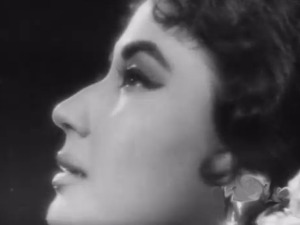
Meena Kumari, a face, which launched thousand tragic films. A thousand might be a bit of exaggeration, but she alone on her star-power helped tragic films to great success. In the 50s and even in the frolicking, colourful 60s, people would flock the cinema halls (to different degrees) to see her suffer. She was also an adept comedienne, in which she also excelled and was quite successful as seen in Magroor [1950], Miss Mary [1957], Azaad [1955] and Kohinoor [1960].
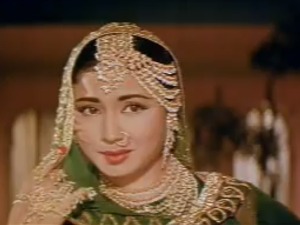
Meena Kumari at a certain time in my childhood played a big role in shaping the image of women in my psyche. Exposed to a slew of films, where she played a neglected wife, a suffering daughter-in-law, a sacrificing daughter, a caring sister-in-law, a protective sister or ‘simply’ a tormented woman between two men, she moulded an image of women being forever doomed to suffer at the hands of men in life. It is true that even other leading ladies like Mala Sinha (Anpadh) or Nutan (Khandan, Chhota Bhai) played such roles but it was as if they were impersonating Meena Kumari in these films. Meena Kumari remained always the original and the one to which others had to match to.
The presence of strong, independent and liberal women in my family and surroundings though would rectify the image in my mind; Meena Kumari would nevertheless always remain special.
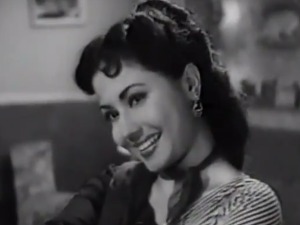
On 31st March it was her 41st death anniversary. To commemorate it here are ten of my favourite songs filmed on her. Read the rest of this entry »
Tags: 31st March, 41st death anniversary, aaj ham apni duaon ka asar dekhenge, aaj to meri hansi, ajeeb dastan hai yeh, Akeli Mat Jaiyo [1963], Asha Bhosle, Ashok Kumar, Bahu Begum [1967, Baiju Bawra [1952], C Ramchandra, chalo dildaar chalo, chalte chalte, Chitralekha [1964], Dil Apna Aur Preet Parai [1960], Dil Ek Mandir [1963], duniya kare sawaal to ham kya jawab de, Durga Khote, Edwina Violette, Geeta Dutt, Ghulam Mohammad, Gomti Ke Kinare [1972], ham tere pyar me saara aalam, Hasrat Jaipuri, Hemant Kumar, inhi logon ne, Kaajal [1965], Kamal Amrohi, kitni jawan hai raa tkoi yaad aa gaya - Azaad [1955], Lata Mangeshkar, Madan Mohan, Majrooh Sultanpuri, mausam hai aashiqana, Meena Kumari, mohe bhool gaye sanwariya, My ten favourite Meena Kumari songs, Nadira, Naushad, Pakeezah [1972], piya aiso jiya me samay gayo re, Raaj Kumar, Rajendra Krishna, Rajendra Kumar, Ravi, Roshan, Sahib Bibi Aur Ghulam [1962], Sahir, Sahir Ludhianvi, sansar se bhaage phirte ho, Sawan Kumar Tak, Shailendra, Shakeel Badayuni, Shanker-Jaikishan, thade rahiyon, tora man darpan kehlaye, woh jo milte the kabhi
My ten favourite insomnia songs
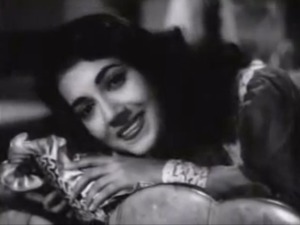 Spending the night in bed tossing around has happened to each and everybody of us. One would like to sleep, but the stream of thoughts just don’t end. The body is tired, but the mind wide awake. You tell yourself, that you have so many things to do the next day and the most appropriate thing to do now would be to sleep. You get irritated over it, which make matters only worse. And then in the wee hours of the morning, when you are supposed to be soon getting up, you fall asleep in sweet, sweet slumber! A dear friend of mine, Raja, was in this situation a few days back. This unfortunate incident made me come up with this list.
Spending the night in bed tossing around has happened to each and everybody of us. One would like to sleep, but the stream of thoughts just don’t end. The body is tired, but the mind wide awake. You tell yourself, that you have so many things to do the next day and the most appropriate thing to do now would be to sleep. You get irritated over it, which make matters only worse. And then in the wee hours of the morning, when you are supposed to be soon getting up, you fall asleep in sweet, sweet slumber! A dear friend of mine, Raja, was in this situation a few days back. This unfortunate incident made me come up with this list.
But the songs below don’t sing about the situation described above, but are rather moans of separated lovers or are freshly-fallen-in-love pairs. For this list, I have chosen songs with neend(iyaa) na aaye in the mukhdaa (refrain). I hope you like them as much as I do.
Read the rest of this entry »
Tags: Aji Bas Shukriya [1958], Amar Prem [1974], Amirbai Karnataki, Amrita Singh, Anand Bakshi, Anil Biswas, Anita Guha, bairan neend na aaye mohe, bairan nindiya kyun nahin aayi, beimaan tore nainawaa neendiya na aaye, Chachaa Zindabad [1959], D. N. Madhok, Dhun [1953], Dilip Kumar, Faroque Kaiser, geeta bali, Hansraj Bahl, Hemant Kumar, insomnia, jaane kyaa baat hai, Kaifi Irani, Kalyanji-Anandji, Lata Mangeshkar, Madan Mohan, Madhubala, Meena Kumari, Miss Mary [1957], Munimji [1955], my ten favourite insomnia songs, Nalini Jaywant, Nargis, neend na aaye, neendiya na aaye, o neend na mujhko aaye, Post Box 999 [1958], Pujaari [1946], R. D. Burman, raina beeti jaaye, Rajesh Khanna, Rajinder Krishan, Roshan, S. D. Burman, saajan bin neend na aave, saari saari raat teri yaad sataye, Sahir Ludhianvi, Shakila, Sharmila Tagore, so gaya saara zamana, Sunil Dutt, Sunny Deol, Sunny [1984], Tarana [1951], tum bin piya nindiya na aaye, Wali Sahab
-
Seeing no new post from me on my blog, my readers got concerned about it. Pacifist just couldn’t tolerate this utter neglect and came again to my rescue. thank you, dear Pacifist. This is her third post on this blog and with it she is showing her business acumen. Bravo, Pacifist! More power to the small businessmen and -women!
Pacifist’s choice of 10 songs of small business
Thank you Harvey. I’m quite pleased at having this opportunity of posting 10 songs on a subject I have often thought about. People selling stuff, doing business. It was a wonderful time of economic opportunity, letting the small fish survive. Today they have been eaten up by the big fish. I don’t mean to imply that they all sold stuff in the filmi manner, but sell, they did.
So in memory of those small dying/dead businesses, here are 10 such songs.
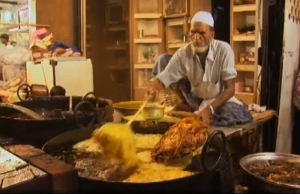
I do have more than 10 songs with a different product being sung and sold, but I’m such a sucker for melody, tunes which are pleasing to my ears that I left some and took some even though the product got repeated. Boot Polish was one such, Tel Maalish another 🙂
Read the rest of this entry »
Tags: aaj ki taaza khabar, Asha Bhonsle, baman ho ya jaat, Bhagwaan, boot chappal sandal- Karigar (1958), C Ramchandra, channa chor garam babu, Chitragupt, dev anand, Dhumal, ek aana boot polish do aana tel maalish, Film Pyaasa (1957), Ghar ki Laaj (1960), Guest Post, Jaan Nissar Akhtar, Jadoo [1951], Johnny Walker, Kabhi Andhera Kabhi Ujala (1958), Karigar (1958), Kishore Kumar, lelo choodiyan main laya nirali, lelo lelo do phool jani lelo, Majrooh Sultanpuri, Maya [1961], Meena Kumari, Mohammad Rafi, Mukesh, Nalini Jaywant, Naushad, Naya Andaaz (1956), O. P. Nayyar, OP Nayyar, Pacifist, Prem Dhawan, Rajendra Krishan, Ravi, Sahir Ludhianvi, Sajid Khan, Salil Choudhary, sar jo tera chakraye, SD Burman, Shakeel Badayuni, Shamshad Begum, Shanti Mathur, Sheikh Mukhtar, Son of India (1962), surma mera nirala, Tel Maalish Boot Polish (1961), This Singing Business, Usha Mangeshkar, zindagi hai kya, Zorabai
Arunji has been a loyal follower of this blog and has always been very much encouraging with his comments and suggestions. This is his second post here on this blog in the role of an author. It is an honour for me that he agreed to do this post. His personal reminiscences as usual makes this post more dear to me. Thank you Arunji!
Arunkumar Deshmukh’s ten favourite songs with “interesting” lyrics
Words like ‘Dumbak dumba’ or ‘chidi chapata ‘ or Ding dong etc always attracted me in Hindi songs. In the early 50s I was an avid listener of Radio Ceylon. They used to have a weekly programme of ‘ Anokhe Bol ‘ for 15 minutes. I waited thru the week for this programme. it was my favourite programme. Songs played in this programme had odd words in it and those songs haunted me for the entire week till the next programme, when next set of songs took over.
 From my early childhood i was very fond of seeing films and enjoying its music. We were in Hyderabad State. This being a Muslim ruled state; there were many peculiar things in those days. For example, in most Theatres, there used to be a class called “ZANANA “(Ladies Only). This was like a balcony. It was meant for those Burkha-clad Muslim women who wanted to see the films, without being seen by the men folk. A huge cloth curtain was dividing the Zanana Class and the rest of the Theatre. A She-male or a He-female (I don’t know which! ) was appointed with the exclusive duty of removing the huge curtain once the film started and closing it before or as soon as the Interval or the end of the film, so that the women could see the film and still not get exposed to the prying eyes of the men folk in the theatre.
From my early childhood i was very fond of seeing films and enjoying its music. We were in Hyderabad State. This being a Muslim ruled state; there were many peculiar things in those days. For example, in most Theatres, there used to be a class called “ZANANA “(Ladies Only). This was like a balcony. It was meant for those Burkha-clad Muslim women who wanted to see the films, without being seen by the men folk. A huge cloth curtain was dividing the Zanana Class and the rest of the Theatre. A She-male or a He-female (I don’t know which! ) was appointed with the exclusive duty of removing the huge curtain once the film started and closing it before or as soon as the Interval or the end of the film, so that the women could see the film and still not get exposed to the prying eyes of the men folk in the theatre.
Read the rest of this entry »
Tags: Aawaz, Ajit, Aka baaka chidi chadaka, Asha, Asha Bhosale, Ashok Kumar, Aye Ichak Beechak Churr, Aziz Kashmiri, Bawre Nain, Bhagwan Sinha, Bimal Roy, C Ramchandra, chhupa chhupi agad bagad, Cuckoo, Denewala Jab bhi deta, dev anand, Dhitang Dhitang bole, Dholak, Do Bigha Zameen, Eena Meena Dika, Ek Do Teen, Ek Thi Ladki, Funtoosh, geeta bali, Gupchup gupchup pyar Karen, Halla Gulla Layilla, Haryala sawan aaya, Hemant Kumar, Hyderabad State, k. n. singh, Kidar Sharma, Kishore Kumar, Lara Lappa, Lata, Majnu, Manna Dey, Meena Kumari, Meena Shorey, Mehmood, Nimmi, Prem Dhawan, Rafi, Raj Kapoor, Rajendra Krishna, Roshan, S. D. Burman, Sahir Ludhiyanvi, Sailesh Mukherjee, Salil Chaudhary, Sandhya Mukherjee, Satish Batra, Savera, Sazaa, Shailendra, Shamshad Begum, Sheila Ramani, Shyamsunder, Vinod, Vyjayantimala, Zanana Class
My 10 favourite Madan Mohan-Asha Bhosle songs

When one thinks of Madan Mohan, one invariably thinks of Lata Mangeshkar. Their cooperation has brought out many a gem, but his partnership with the younger Mangeshkar sister still remains in the shadow of the bigger tree. Here I have listed some of my favourite songs resulting from this collaboration.
I have included only her solo numbers in this list. Enjoy!
Read the rest of this entry »
Tags: Aakhri Dao [1958], Akeli Mat Jaiyo [1963], Anita Guha, ashkon se tere hamne tasveer banayi hai, Bank Manager [1959], Chacha Chaudhary [1953], Dekh Kabira Roya [1957], hai unki woh nigaahen, ishq ek zeher sahi phir bhi, jaane kya haal ho, Jalal Malihabadi, Kaifi Azmi, koi shikwa bhi nahin koi shikayat bhi nahin, Maa Ka Aanchal [1970], Maharaja [1970], maine pee li mera dil kiya, Majrooh Sultanpuri, Meena Kumari, Mem Sahib [1956], Mere Piya Chhede Jiya, Mohan ki Asha, My 10 favourite Madan Mohan-Asha Bhosle songs, Neend Hamari Khwab Tumhare [1966]Nanda, Nutan, Raja Mehdi Ali Khan, Rajendra Kishan, Rajendra Kumar, saba se yeh keh do, Shammi, Shashi Kapoor, Shashikala, Shekhar, shokh nazar ki bijliyan, thodi der ke liye mere ho jao, Woh Kaun Thi [1964]
Arunji has been a loyal follower of this blog and has always been very much encouraging. With this post he makes his debut here on this blog in the role of an author. It is an honour for me that he agreed to do this post. His personal reminiscences makes this post more dear to me. Now, without much ado I give the microphone to him.

It is said, that Indian Films represent the life in India. There is, however, a section of people who believe that the society emulates what is shown in films. So, what is the truth?
When the Talkie came to India and films were made, only one thought was there in the minds of the producers and that was to make films based on Mythological and Historical stories.
This went on for first 5-6 years, but then film makers realised that people will like their films if they could relate their lives with it. So, films based on stories with village background, the caste system, dowry, the moneylender and the farmers were made. These became popular. The urban and the city viewer who was educated were looking for something different. Thus, films were made on love stories set in cities and bigger towns.
Those days middle class was growing in India by leaps and bounds and these were the people, who could spend the money. Now these were the people the films were aimed at.
In the 40s and 50s, the most common transportation vehicle was CYCLE. Almost everybody knew how to ride a cycle. Few people had cars and motorcycles had not yet become popular. Scooters were yet unknown.
I remember, I got my first Cycle when I was in school. My school was 3-4 miles far and I used the cycle to go to school in the morning and to go to friends in the evening. There were many cycles on the road and there was a Traffic rule that every cycle must have a Lamp on the Cycle’s handle as a caution to other vehicles. These lamps were kerosene and Cotton-batti lamps in the night. Sometimes, the lamps got extinguished due to wind. Unaware of this, the police used to catch us. On hearing our plea about the lamp, wind etc, the police would touch the glass of the lamp. if it was still warm, we were let out with a warning only. This was the life in late 40s and early 50s, when I was in Hyderabad State.

It was natural that now cycles too should feature in films. Imaginative Directors used cycles for the heroes when they chased the heroines and for the heroines when they went on a picnic with sahelis. In many films, the village affluents would be shown as cycle owners and the city people using it for moving about.
Up to the 70s, cycles were part of many films. Slowly, cycles were replaced by scooters, Mopeds and motor cycles in films and by 80s, it was only cars and fancy Mobikes for the heroes. Poor cycles were reduced to be shown, only used by the doodhwalla bhaiyyas (milk-men).
Read the rest of this entry »
Tags: Aas Ka Panchhi [1961], Agra Road [1957], akela hoon main, Ameeta, Arunkumar Deshmukh, Arunkumar Deshmukh’s 10 favourite cycle songs, Asha Bhsole, Baat Ek Raat Ki [1962], C Ramchandra, dev anand, dil mera ek aas ka panchhi, Ek Hi Raasta [1956], G. M. Durrani, Geeta Dutt, Ghulam Haider, Guest Post, Hasarat Jaipuri, Hemant Kumar, Hum Sab Chor Hain (1956), humko hansate dekh zamana jalata hai, I. S. Johar, inse rippy tippy ho gayi, Johnny Walker, Kalyanji-Anandji, Kavi Pradeep, Khan Mastana, Khazanchi [1941], Kishore Kumar, Lata Mangeshkar, main chali main chali, Majnu, Majrooh Sultanpuri, manaa janaab ne pukara nahin, Meena Kumari, Mehmood, Mohd. Rafi, Mukesh, Nutan, O. P. Nayyar, Omprakash Bhandari, Padosan [1968], Paigham [1959], Paying Guest [1957], Prem Dhavan, pyaase panchhi neel gagan ke, Pyaase Panchhi [1961], Qamar Jalalabadi, R. D. Burman, Rajendra Krishna, Rajendra Kumar, Roshan, S. D. Burman, saanwale salone aaye din bahar ke, Saira Bano, sawan ke nazare hain, Shakila, Shamshad Begum, Shankar-Jaikishen, Subir Sen, Sunil Dutt, suno re bhaiyya hum layen hain, Vijay Anand, Wali Saheb
My ten favourite bangala (bungalow) songs

A dream of one’s own house/cottage in the suburbs has been and is the motor of many middle class households all over the world. Maybe it is the security it offers or the need for privacy, to have a garden and the cosy life which one associates with it and thus to achieve ultimate goal of every human being to be happy. If one really ‘achieves’ all these things with the acquisition of this cosy house is secondary. I think the dream in itself the best part of it.

Like many of the dreams and aspirations of the common man (whoever or whatever he/she is), even this aspect has not been neglected in the Hindi film songs. Here are my favourites!
Read the rest of this entry »
Tags: aag lage bangle me, aaiye aapko main apne bangle ki sair, Aap Ki Khatir [1977], Aji Bas Shukriya [1958], Anand Bakshi, Asha Bhosle, Asha Parekh, bangala, bangla, Bappi Lahiri, Basu Manohari, Bengal, dariya kinare ek bangalo, dev anand, DevAnand, European settlers, Farida Jalal, Farooq Qaiser, G. M. Durrani, ganga ki reti pe bangala chhawaai, geeta bali, Ghulam Mohammed, hai lagaa, House No. 44, hum to tere dil ke bangale me aanaa maangtaa, Iftekhar, ik bangala bane nyaara, Johnny Walker, Joroo Ka Ghulam, K. L. Saigal, Kaala Paani, Kalyanji-Anandji, kanta lagaa, Kidar Sharma, Kishore Kumar, Lata Mangeshkar, Magroor [1950], Majrooh Sultanpuri, Meena Kumari, Mirza Ghalib [1954], Mohammed Rafi, My ten favourite bangala songs, My ten favourite bungalow songs, Nalini Jaywant, Nanda, nazar laage raajaa tore bangale par, o daata o daataa de hamko bhi ek pyaara bangala, Pankaj Mullick, President [1937], pyaara ek bangala ho, R. C. Boral, R. D. Burman, Raja Mehdi Ali Khan, Rajesh Khanna, Rehman, Rekha, Roshan, S. D. Burman, Sabse Bada Rupaiya [1976], Sahir, Samadhi 1972, Shaili Shailendra, Shakeel Budayuni, Shamshad Begum, Sudha Malhotra, Suraiya, Vinod Khanna, Vinod Mehra
My ten favourite songs on clouds and separation

Mid-June, the rains used to arrive in Bombay when I was a kid. The black clouds would hold the promise of change. This would mean relief from the heat and dust of the preceding summer months and a burst of new life. The dreary plain near our house would promise to turn into a pond with lots of small streams arising and emptying in it. These small streams would then become alive with small and big crabs and tadpoles! Coinciding with the arrival of the black clouds, the new school year would also arrive. This would mean new textbooks! The dark messenger would also bring the hope, that I would share the class room with my friends from last year, but at the same time also the anxiety if I would again have to spend this new school year with class bully.
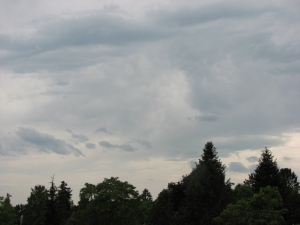
These dark water-bearers of sky, who brought so many emotions in my being were and are also the bearers of hope over the centuries in India for separated lovers. The earliest mention is found in Meghduta (the cloud messenger) by Kalidasa (most probably 4th century CE). It tells the story, how a yakṣha (a supernatural being), after being exiled, asks a passing cloud to take a message to his wife. In Hindi cinema though, we find mostly women singing to the clouds. They call upon them to be their messengers, to take a message to their far-off beloveds, asking them to return back.
Read the rest of this entry »
Tags: Ameeta, Anil Biswas, Asha Bhosle, Azaad [1955], Bahana [1960], Bharat Vyas, C Ramchandra, Chashm-e-Baddoor [1981], Chhote Nawab [1961], clouds, D. N. Madhok, Dar Laage Garaje Badariyaa, Deepti Naval, Dharti Kahe Pukar Ke [1969], Dilip Kumar, Gaban [1966], Ghar Aaja Ghir Aaye Badaraa Sanvariyaa, Gulzar, Haimanti Shukla, Indu Jain, Ja Re Kare Badra, Jaa Re Badara Bairi Jaa Re, Jaa Ri Jaa Ri O Kaari Badariya, Jab Kaari Badariyaa Chhaayegi, Jeetendra, Kahan Se Aaye Badaraa, Kalidasa, Karan Deewan, Lajawab [1950], Lata Mangeshkar, Laxmikant-Pyarelal, Madan Mohan, Majrooh Sultanpuri, Meena Kapoor, Meena Kumari, Meghduta, Mehmood, Mohammed Rafi, monsoon, My ten favourite songs on clouds and separation, Namkeen [1982], Nanda, Naushad, Of Clouds and Separation, Phir Se Aiyo Badaraa Bidesi, Prem Dhawan, R. D. Burman, rain, Rajinder Krishan, Rajkamal, Ram Rajya [1967], Rattan [1944], Sadhana, Sawan Ke Badalon Unse Yeh Jaa Kaho, Shabana Azmi, Shailendra, Shankar-Jaikishan, Sheila Vaz, Sunil Dutt, Swarnlata, the cloud messenger, Tum Bin Sajan Barase Nayan, Vasant Desai, yakṣha, Yesudas, Zohra Bai
First of all I would like to thank everybody for their good wishes to my/our blog on its birthday.
The quiz got a nice response. Shashi and Samir sent me the answers the very next day. They had some sophisticated techniques to get to the answers. Samir in his feedback to the quiz elaborated on it. Samir, would you be so kind to post it also in the comments section below? It is very enlightening!
Lalitha was very industrious and worked till the last hour and sent me her answer four hours back.
Totally eight persons sent me their answers and it was fun going through them. Lomo and Andi were new for me. They told me that they usually read my posts and the comments by the readers and that they enjoy it a lot and at times more the comments than the post itself (so says Andi).
Here are the scores
Archana = 128,5
Pacifist = 126
Shashi = 124
Samir = 106
Lomo = 100
Lalitha = 93
Andi = 93
Anu = 55
Congratulations Archana for scoring the most points and thanks to all participants! The email communication with you regarding the hints and clues was a source of great pleasure for me!
Well, here are the answers! Read the rest of this entry »
Tags: 5 Rifles, Aaj Yeh Meri Zindagi, Aar-Paar, Abhi To Haath Me Jaam Hai, Ambika Johar, Amitabh Bachchan, Anand Bakshi, Anjaan, Asha Bhosle, Aziz Nazan, Bappi Lahiri, Chandan Ka Palna [1967], Chhod Mera Haath Mujhe Peene De, dev anand, Dharamendra, Dil Hi To Hai [1963], former Miss India, Geeta Dutt, happy God, Hasrat Jaipuri, Hoon Abhi Main Jawan Ae Dil, Hum Hain Nashe Mein, Jhoom Bharabar Jhoom Sharabi, Kishore Kumar, Lata Mangeshkar, Laxmikant-Pyarelal, Leela Naidu, Madan Mohan, Mahjabeen, maid of jerky movements, Majrooh Sultanpuri, Manna Dey, Meena Kumari, Mohd. Rafi, Mujhe Le Chalo, Mukesh, Namak Halal, Naza Sholapuri, Nutan, O. P. Nayyar, R. D. Burman, Raj Kapoor, Rajinder Krishan, Rakesh Khanna, Ramlal, Ravi, Roshan, Sahir Ludhianvi, Sandhya, Seeta aur Geeta [1972], Sehra [1963], Shahi Kapoor, Shakila, Sharaabi, sharabi sharabi mera naam ho gaya, Subah-O-Sham [1972], the illustrious one, Thodi Si Jo Pee Li Hai, Tumhari Mast Nazar, Waheeda Rehman, Yeh Raaste Hai Pyar Ke
















